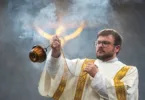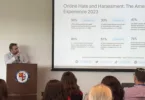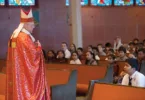
Dr. José Luis Perez Guadalupe smiles while welcoming those present to Our Lady of Unity Parish’s first Spanish evangelization conference. Perez shared his research on why Hispanic Catholics leave the church. LEAVEN PHOTO BY JOE MCSORLEY
by Olivia Martin
olivia.martin@theleaven.org
KANSAS CITY, Kan. — It doesn’t take a sex abuse crisis for Catholics to leave the practice of their faith.
At a Spanish-language conference held Aug. 18-19 and sponsored by Our Lady of Unity Parish in Kansas City, Kansas, participants learned that many Hispanic Catholics have left the church over the last 40 years.
Some leave because they consider the church to be out of touch with reality.
Others because the doctrine is too strict. Or because the pews are uncomfortable.
“Each of these reasons is true,” said Dr. José Luis Perez Guadalupe, a sociologist and former interior minister of Peru, “but that’s not the [most fundamental] reason.”
Perez was one of the keynote speakers at the conference, which was held at St. Patrick Parish center in Kansas City, Kansas, and was the first Spanish-language evangelization program of its kind in the archdiocese.
The number one reason that Hispanics have left the Catholic Church?
They did not find what they were looking for, said Perez.
The statistics
Perez’s presentation — titled “Why Do Catholics Leave the Church?” — couldn’t have come at a more crucial time.
He has conducted primary sociological research about the changing religious climate in Peru and across South America, Central America and the United States over decades.
And his research reflects the shift in numbers belonging to specific religious traditions, such as Catholicism and evangelical Protestants, as well as those who profess no religion and atheists. He also collected people’s reasons for leaving Catholicism.
The results were startling.
Since the 1970s, nearly every religious group in Latin America and the U.S. has decreased — except for evangelical Protestantism and “nones,” those who profess no religion.
And since 2003 in the U.S., the number of evangelicals and “nones” has grown while the number of Catholics has remained the same.
“Four of the six most Catholic countries in the world are in [the Americas],” said Perez. These include Brazil, Mexico, the U.S. and Colombia.
Of all of the Hispanics in the U.S., 55 percent are Catholics, 22 percent are Protestant and 18 percent profess no religious affiliation.
“Almost one of every five Hispanics no longer has a religious affiliation,” said Perez. “Latin America is ceasing to be Catholic.”
His research shows that about 92 percent of Catholics who left the church said they wouldn’t have left if they’d have found what they were looking for.
“This is a very grave situation for us,” said Perez, “[because] our church isn’t being attractive.”
Furthermore, the American church cannot afford to lose people, especially Hispanics and Latinos.
“More than 50 percent of Catholics in this country are Hispanic,” said Perez.
“God is telling us it’s our turn as Catholic Hispanics in this country,” he continued. “This is why Hispanic pastoral ministry is becoming more and more important.”
What the parish can do
Araceli Dueñas, a parishioner of Our Lady of Unity, was taken aback by Perez’s presentation.
“It was eye-opening,” she said. “We think that people don’t go to church just because they don’t want to — this is a time for us to change.”
Karla Morales, also an Our Lady of Unity parishioner, said that, over the years, she has noticed a fear of change within the church and found the conference helpful and informative in moving out of that fear.
“My belief in my faith has not changed,” said Morales, “but the Catholic Church must make changes.”
“If we in our parish change our attitude or our welcoming words just a little bit,” said Dueñas, “that would be an awesome starting place.”
To stop losing Catholics at such a high rate, Perez explained that each person needs to have the three C’s: converted, convinced and committed.
“It’s one thing to be converted and convinced,” he said, “but if we don’t have committed Catholics, we cannot go on.”
“Sometimes we are so close- minded that we don’t want to commit,” said Dueñas, “but [if we do], that can give new people the opportunity to be involved in the parish.”
The conference also included a presentation on emotional intelligence by Jose Grau, a professor and member of the Pastoral Leadership Institute at the University of St. Mary of the Lake in Mundelein, Illinois.
It concluded with a concert by Tony Melendez, the world-renowned guitarist born without arms, who has performed multiple times for Pope John Paul II and now performs frequently on behalf of pro-life causes.






